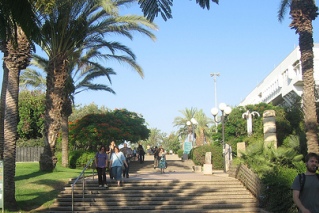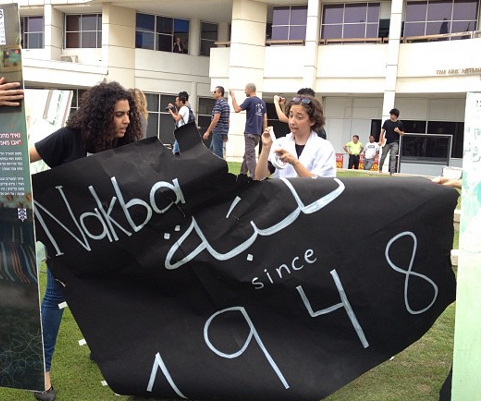 Tel Aviv University. Photo CC-BY Shlomi Fish
Tel Aviv University. Photo CC-BY Shlomi FishToday (14 May 2012), the Knesset Education Committee held a heated discussion regarding an event organized by students at Tel Aviv University to mark the Nakba Day – the annual commemoration of the displacement of over 700,000 Palestinian Arabs in the Arab-Israeli wars of 1947-49 (Israel’s War of Independence). See highlights from the committee discussion below.
According to media reports, the university’s security department conditioned this event on several demands, among them requiring the students to pay the event’s security expenses and for the presence of at least six security personnel. According to other reports, Education Minister Gideon Sa’ar urged Tel Aviv University to reconsider its decision to allow the students to organize this event.
Ahead of this Knesset discussion, ACRI sent a letter to members of the Education Committee, stating that freedom of expression in university campuses must be protected: “ACRI is concerned about attempts to restrict freedom of political expression.” ACRI’s letter states that the university is obligated to safeguard freedom of political expression within its campus, both because it is an institution for higher education and because of the Student Rights Law, which enshrines students’ right to organize and to demonstrate “on any issue.” Therefore, requiring the students to pay the security expenses is wrongful, contradicts the university’s obligation to protect freedom of expression, and even constitutes a punishment for organizing this event.
According to ACRI, “attempts to silence minority views have become almost a routine in Israel. However, the university, which is supposed to be a sanctuary for freedom of thought and expression, must vehemently defend freedom of expression and not succumb to pressure from politicians.”
The Knesset discussion continued as the university event was already starting. According to reports, hundreds of people participated in that event, both in support of it and to protest against it, and clashes took place between both camps.
Highlights from the Knesset discussion – after the photo below.
For further background about the Nakba Law:
https://law.acri.org.il/en/knesset/nakba-law/
More on ACRI’s petition to the High Court against the Nakba Law:
https://law.acri.org.il/en/2011/05/04/petition-to-high-court-nakba-law-is-unconstitutional
Highlights from the Knesset Education Committee discussion:
During today’s discussion in the Knesset, the Council for Higher Education called on universities to use their judgment and not to provide a stage for violence, racism, violence, incitement, and violations of freedom of expression. A Tel Aviv University representative stated that the University will follow the Student Rights Law as well as the Budget Foundations Law (the official name of the “Nakba Law”). “As long as there is no violation of the law or of public order, we approve events,” said the university’s representative. However, he added: “Should the students hold a moment of silence, it will constitute a deviation from their permit and we will take care of it.”
In response to this, MK Alex Miller (Yisrael Beitenu) noted: “When I legislated the Student Rights Law, this was the last thing we intended, to enable such an event. We will change the law, amend it.” Towards the end of the discussion, MK Miller added: “We gave students the freedom to protest not in order for them to commemorate the Nakba Day.”
One student, who attended the discussion and spoke, said she came “to protest the fact that the university is so left-wing” and added: “We manage lists of lecturers’ political views, we have a list of names of leftist post-Zionist professors.”
MK Dov Khenin (Hadash) read aloud the letter that ACRI sent to the members of the committee, and stated that: “Attempts to restrict the freedom of political debate always start with controversial issues. The test of freedom of expression is in those things that are upsetting – this is when freedom of expression must be protected, and freedom of political expression is at the heart of freedom of expression.”
MK Jamal Zahalka (Balad): “I’m glad we’re having this debate because finally, we are talking about the Nakba.” He added: “According to what is being said today, Prof. Yeshayahu Leibowitz would have been kicked out of the university and Magnes would also not have a place there.”
MK Yariv Levin (Likud) stated: “Academic freedom must be protected, but this has nothing to do with academic freedom. Rather, the question here is whether an academic body can approve an event that undermines the State in which it takes place.”
Ironically, no representatives of the Finance Ministry attended the discussion, despite the fact that the Nakba Law is in fact an amendment to the Budget Principles Law and authorizes the Minister of Finance to relinquish monetary support from an institution that made any payment towards an event or action that marks the date of Israel’s establishment “as a day of mourning.”
ACRI’s claim in our petition to the High Court of Justice (a petition that was rejected by the court) was that the Nakba Law has a chilling effect on freedom of expression and on public political debate. Was this chilling effect felt in today’s Knesset discussion?
You be the judge of that.








